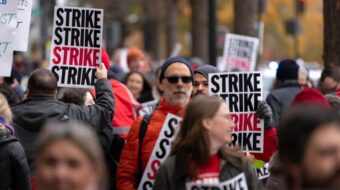As the war against Iraq entered its second week, the river of anti-war protests around the world showed no sign of drying up. Reports of attacks on civilians, including bombing by U.S. and British troops, and the pictures of terrified families fleeing the billowing flames, led demonstrators to express their growing outrage at the terror and immorality of the war. Bases launching the devastating air strikes against Iraqi cities were increasingly sites of protest.
In Germany, over 50,000 gathered in Berlin’s Tiergarten Park., on March 30. Several thousand more formed a human chain that temporarily blocked the entrance to the U.S. European Command headquarters in Stuttgart, while in Frankfurt, 2,000 held a sit-in at the U.S. Air Force support base. But the most dramatic event was the 40,000-strong human chain joined by trade unionists, city council members, religious groups, entire schools and many residents, that connected the city halls of Munster and Osnabruck. The demonstrators clasped hands over the 35-mile route traveled in 1648 by negotiators who ended Europe’s Thirty Years War.
Among the demonstrators was Mechtild Dehmel of Munster, a medical worker in World War II. “I remember hearing the men’s screams, their worries about their families and I remember them dying,” she told Deutsche Welle. “The only thing I can think about right now is Iraq, the people there and everything that’s happening. I think it’s really terrible.”
“We want this to be a highly symbolic event,” said Klaus Mertens of the Munster Freedom Forum, a sponsoring organization. We are here in Munster and Osnabruck, the cities that first established peace in this region. And this is also the place in Germany where human rights were first established. That’s what this is about.”
Historic symbolism was also evident in Rome, where protesters hung black sheets from the sides of 16 bridges over the Tiber River, some of which had been crossed by invaders and defenders in earlier centuries. At Vicenza, in northeastern Italy, protesters threw red paint and flares at the walls of a U.S. military base that had been used by paratroopers now in northern Iraq.
Jakarta, Indonesia, saw its biggest anti-war protest to date, as up to 300,000 demonstrators representing organizations including the country’s largest Islamic groups marched a mile from the British Embassy to the U.S. Embassy. Many wore headbands stating, “Peace, No War,” and carried banners reading, “Bush, Iraq is not your killing field.” At the U.S. Embassy, speakers demand U.S. withdrawal from Iraq and the trial of President Bush and the British and Australian prime ministers as war criminals.
Beijing University students, and foreign residents in Beijing, also held anti-war protests over the weekend, while in Japan, over 2,000 people formed the Japanese words for “No War” in the western city of Osaka, and then marched to the U.S. consulate to demand U.S. and British troops leave Iraq. In Pakistan, the fourth in a series of giant protests referred to as “the million man march” brought out an estimated 100,000 demonstrators in Peshawar, while smaller protests took place in Multan and Quetta.
“They have not uncovered any weapons of mass destruction, doesn’t that make you think, comrades?” said African National Congress member of Parliament Pallo Jordan to some 10,000 protesters gathered at the U.S. consulate. “What the war was about from the very beginning was to … put their own government in there, so they can gain access to Iraqi oil.” An anti-war coalition that includes the ANC, the Congress of South African Trade Unions, the Council of Churches, Muslim Judicial Council and South African Communist Party, is considering calling a boycott of products from U.S. based transnational corporations. Their memorandum condemns the war as unjust, illegitimate and morally unjustifiable.
In Athens, a rally called by all the political youth organizations of Greece brought thousands of young people to an anti war concert and demonstration at Syntagma Square, in front of Parliament, on March 29. The organizations issued a joint statement denouncing “the undisguised imperialist war” and demanded that Greece not help the U.S. and its allies in any way. At the same time, in Thessaloniki, the Greek Committee for International Peace and Detente held a mass demonstration that ended in front of the U.S. consulate. On March 30, thousands of members of the Communist Party of Greece and Young Communist League – some of whom arrived by ship from Athens – protested at the U.S. base in Suda Bay, Crete to demand its closing. On the same day, the peace movement blocked the NATO headquarters at Tirnavos.
Political fortunes were also buffeted by the anti-war torrent. The latest Spanish opinion poll confronted Prime Minister Jose Maria Aznar – participant with George Bush and Britain’s Tony Blair at the March 9 pre-war summit in the Azores – with an overwhelming 91 percent anti-war majority. Two months ago, Aznar’s People’s Party was about even with the anti-war Socialist opposition, but now the People’s Party is behind by six percent, and most observers expect the Socialist Party to win the 2004 elections.
Former People’s Party president Felix Pastor, still a member of its leadership body, broke last week with Aznar, saying the Bush administration’s policies “are so detestable that we should keep well away.” Groups of protesters often follow government ministers, while a former minister and several lower ranking party members have resigned over the government’s pro war stance.
In Germany, where 84 percent of the population opposes the war, Angela Merkel, head of the opposition right-wing Christian Democratic Union, found herself under siege from leaders and members of her own party while backing for the Christian Democrats slipped from 54 percent before the attack to 50 percent this week and nearly half of likely Christian Democratic voters said they opposed the party’s pro war position. Meanwhile, in a direct challenge to Bush, German President Johannes Rau said March 31, “I don’t believe that a people receives a message from God to free another people.”
Even in Britain, where following the invasion, the pendulum swung from an anti war majority to 54 percent supporting the conflict, popular backing has dropped to 52 percent and opposition has rebounded to 34 percent.
The author can be reached at cpusainternat@mindspring.com
PDF version of ‘The river of protest continues to flow’









